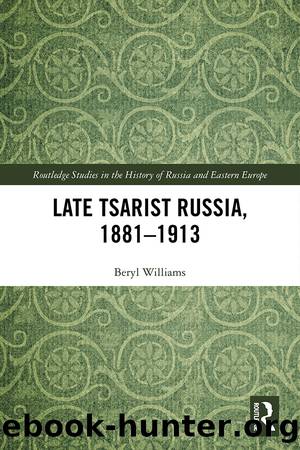Late Tsarist Russia, 1881â1913 by Williams Beryl

Author:Williams Beryl [Beryl, Williams]
Language: eng
Format: epub
ISBN: 9781000178883
Goodreads: 52993261
Publisher: Routledge
Published: 2020-09-17T00:00:00+00:00
Notes
1 Dominic Lieven, Nicholas II. Emperor of all the Russias, London, 1993. pp. 117, 65
2 Vasily L. Stepanov, âAn Autocrat at the Crossroads. Nicholas II between Pobedonostsev and Bungeâ; Sergei V. Kulikov, âEmperor Nicholas II and the State Dumaâ, both in Russian Studies in History, vol. 50, 2012, no. 4
3 Vladimir Timoshenko, âBreakthrough to a New Age? Foreign Economic Factors in the Uralsâ. Economic Development in the Late Nineteenth and Early Twentieth Centuryâ, in Russian Studies in History, vol. 50, 2011, no. 2; Yanni Kotsonis, Making Peasants Backward. Agricultural Cooperatives and the Agrarian Question in Russia 1861â1914, Basingstoke, 1999, pp. 40â8
4 V.I. Gurko, Features and Figures of the Past, Stanford, 1939, pp. 217, 242â3; Sidney Harcave, Count Sergei Witte and the Twilight of Imperial Russia. A Biography, Armonk, NY, 2004
5 Tim McDaniel, Autocracy, Capitalism and Revolution in Russia, Berkeley, 1988, p. 95
6 M.K. Palat, âPolice Socialism in Tsarist Russia 1900â1905â, in Studies in History, 2, 1.n.s. New Delhi, 1986; Dmitry Pospielovsky, Russian Police Trade Unionism, London, 1971, pp. 44â6, 51
7 J. Schneiderman, Sergei Zubatov and Revolutionary Marxism, Ithaca, 1970, pp. 137â40, 312â20; Frederic S. Zuckerman, The Tsarist Secret Police and Russian Society 1880â1917, Basingstoke, 1996, pp. 108â12
8 Gurko, op. cit., pp. 116â17
9 David MacLaren McDonald, United Government and Foreign Policy in Russia 1900â1904, Camb. Mass. 1992, p. 40
10 Alex Marshall, The Russian General Staff in Asia 1800â1917, London, 2006, pp. 90â1; Dnevnik Kuropatkina, in Krasnyi Archiv, 2, 1922, pp. 77â80; Harcave, op. cit., p. 102
11 Ed. H.H. Fisher, Out of My Past. The Memoirs of Count Kokovtsov, Stanford, 1935, pp. 23â4; Dietrich Geyer, Russian Imperialism. The Interaction of Domestic and Foreign Policy 1860â1914, Leamington Spa, 1987, pp. 208â19
12 Tsuchiya Yoshifuru, âUnsuccessful National Unity. The Russian Home Front in 1904â, in eds. David Wolff, Steven G. Marks, Bruce W. Manning, David Schimmelpenninck van der Oye, John W. Steinberg and Yokote Shinyi, The Russo-Japanese War in Global Perspective. World War Zero, vol. 2. Leiden, 2007
13 Rosamund Bartlett, âJaponisme and Japanophobia. The Russo-Japanese War in Russian Cultural Consciousnessâ, in The Russian Review, June 2008, and her âRusso-Japanese War in Russian Cultureâ in eds. Wolff et al. op. cit.; Stephen M. Norris, A War of Images. Russian Popular Prints, Wartime Culture and National Identity, 1812â1945, DeKalb, 2006, ch. 6
14 J.W. Steinberg, âWas the Russo-Japanese War World War Zero?â in The Russian Review, Jan. 2008
15 R.A. Esthus, âNicholas II and the Russo-Japanese Warâ, in The Russian Review, Oct. 1981; Andrew Malozemoff, Russian Far Eastern Policy 1881â1904, Berkeley, 1958
16 Joseph Bradley, Voluntary Associations in Tsarist Russia. Science, Patriotism and Civil Society. Camb. Mass., 2009. p. 237
17 Thomas Riha, A Russian European. Paul Miliukov in Russian Politics, Chapel Hill, 1969; Shmuel Galai, The Liberation Movement in Russia 1900â1905, Cambridge, 1973. pp. 123â32
18 Thomas Paul Porter, âThe Emergence of Civil Society in Late Imperial Russia. The Impact of the Russo-Japanese War and the First World War on Russian Social and Political Life. 1904â1917â, in War and Society, May 2005
19 Gerald D. Suhr, 1905 in St Petersburg. Labor, Society and Revolution, Stanford 1989; Scott M.
Download
This site does not store any files on its server. We only index and link to content provided by other sites. Please contact the content providers to delete copyright contents if any and email us, we'll remove relevant links or contents immediately.
Cecilia; Or, Memoirs of an Heiress — Volume 1 by Fanny Burney(32544)
Cecilia; Or, Memoirs of an Heiress — Volume 2 by Fanny Burney(31943)
Cecilia; Or, Memoirs of an Heiress — Volume 3 by Fanny Burney(31929)
The Great Music City by Andrea Baker(31916)
We're Going to Need More Wine by Gabrielle Union(19034)
All the Missing Girls by Megan Miranda(15950)
Pimp by Iceberg Slim(14487)
Bombshells: Glamour Girls of a Lifetime by Sullivan Steve(14054)
For the Love of Europe by Rick Steves(13905)
Talking to Strangers by Malcolm Gladwell(13346)
Norse Mythology by Gaiman Neil(13345)
Fifty Shades Freed by E L James(13232)
Mindhunter: Inside the FBI's Elite Serial Crime Unit by John E. Douglas & Mark Olshaker(9318)
Crazy Rich Asians by Kevin Kwan(9277)
The Lost Art of Listening by Michael P. Nichols(7490)
Enlightenment Now: The Case for Reason, Science, Humanism, and Progress by Steven Pinker(7306)
The Four Agreements by Don Miguel Ruiz(6744)
Bad Blood by John Carreyrou(6611)
Weapons of Math Destruction by Cathy O'Neil(6264)
